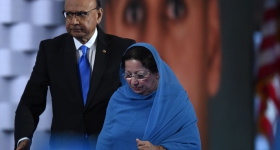Via Angry Asian Man, this story from the Wa Po about an agency in China that arranges for expectant mothers to have their babies in the US so that the babies will have US citizenship:
clients include Chinese doctors, lawyers, business leaders, government officials, well-known media personalities ... Some, the couple said, were giving birth to their second child to skirt China's one-child policy. Most say they do not intend to live in the United States themselves.
And all are affluent, Zhou and Chao said. Unlike the poor illegal immigrants from Central America who try to cross the border to have their babies in the United States, Zhou said, these Chinese parents fly in on first-class seats.
... The reasons they want US passports for their babies are varied, but most come down to two key factors -- education and setting (for the birth).
Okay. So we can probably all agree that people who have no interest in settling in the US and contributing to our civic life and economy have no business snatching our citizenship for their spawn ... whom they also have no interest in turning into genuine, participating, US citizens. In fact, like me you might even find it offensive that the citizenship that is so meaningful (and embattled) an emblem of identity for so many of us, is being treated like a luxury item by rich Chinese.
But. These parents aren't interested in immigrating because they are already at the top of Chinese society: successful professionals with desirable skills, who can afford to give birth abroad as a luxury item. So they (and their spawn) aren't exactly going to be taking jobs or welfare away from US citizens/residents, either. And if they are keeping an option open for their kids, so what? It's not like these kids aren't going to be assets, should they decide to live in the States in the future. They'll be coming from one of the best school systems in the world, and bringing the work ethic and skills, not to mention some of the wealth, that made their parents successes. These are the sorts of folks that get shoved to the front of the immigration line in any case. So maybe it's better that they leave more spots open in said immigration line, for hardworking but less privileged immigrants. So maybe the whole thing is harmless. After all, we're talking about numbers in the low hundreds. It's not exactly an invasion.
And on the third hand, in 20 years is the US still going to be the economic superpower? Won't that be China anyway? Or, at least, won't that duty be shared? Won't it be to our advantage to have skilled, well-educated folks with dual citizenship -- and possibly dual educations, dual rearings, dual identities and dual loyalties -- running our powerful multi-national corporations; people who can speak both idioms and both sets of values, people who will help both countries move out of their entrenched politics and suspicions into a kinder, gentler globalism?
What do you think?
Please make this an interesting and insightful discussion. No grandstanding, straw man arguments, insults, personal attacks, stereotyping, or excessive passion. Please speak with the awareness that your opinion is only that.









Comments
They'll be coming from one of the best school systems in the world
In China (and South Korea), one of the big motivations to get a foreign passport for your kids is so they can opt OUT of the hypercompetitive local school system and attend an international school --- by law, local citizens with no connection to a foreign country can't enroll their kids in those schools otherwise. (A few years ago there was a minor furor in Seoul about parents who used investment visa programs to get Ecuadorian or Malian residency so they could enroll their kids into international schools --- sorry, can't find the story in English, here's a Korean link). Then they follow it up with boarding school and college in the U.S., and drop back into Shanghai, Beijing, or Hong Kong on their golden parachute ...
These silver-spoon babies find themselves the target of (IMO, well-deserved) resentment by locally-educated kids whose high schools required them to work harder and learn more, but who get passed over for the best jobs --- because their knowledge:
(God forbid the American expats in Asia actually have to deal with someone who's really representative of the local culture!)
So I agree with you that birth tourism probably doesn't have much effect on the U.S. ... but I'm quite uncomfortable seeing the U.S. passport (and the English language) used as yet another mechanism for the social elites of foreign countries to maintain their entrenched privilege and pass it on to the next generation.
I'd love to see that article, Eric L. I gotta wonder exactly how far such kids can go in their "home" countries, if they've been educated in English. Sure, they can speak English to foreign clients, but can they speak idiomatic Chinese, or Korean? And written Chinese isn't just something you pick up. It requires years and years of study to write at all, much less write well. I imagine the elites, who want their kids to succeed at home, might not want to educate their children entirely outside of their home countries.
Just a speculation; I have no idea what the facts are.
Local Chinese kids in international schools almost always have enough Chinese-speaking friends outside of school to grow the spoken Chinese proficiency they first acquired at home. And the schools usually separate them out of the normal Chinese-as-a-second-language classes for foreigners, and put them in their own "heritage language maintenance" stream where they actually read authentic, age-appropriate written Chinese materials for a few contact hours each week. In Hong Kong, I've certainly run into a few international school kids who came out functionally illiterate in Chinese, but they're way less common than, say, 1.5 generation kids who forget how to read Chinese after actually immigrating to the US.
I translated the article mentioned above.